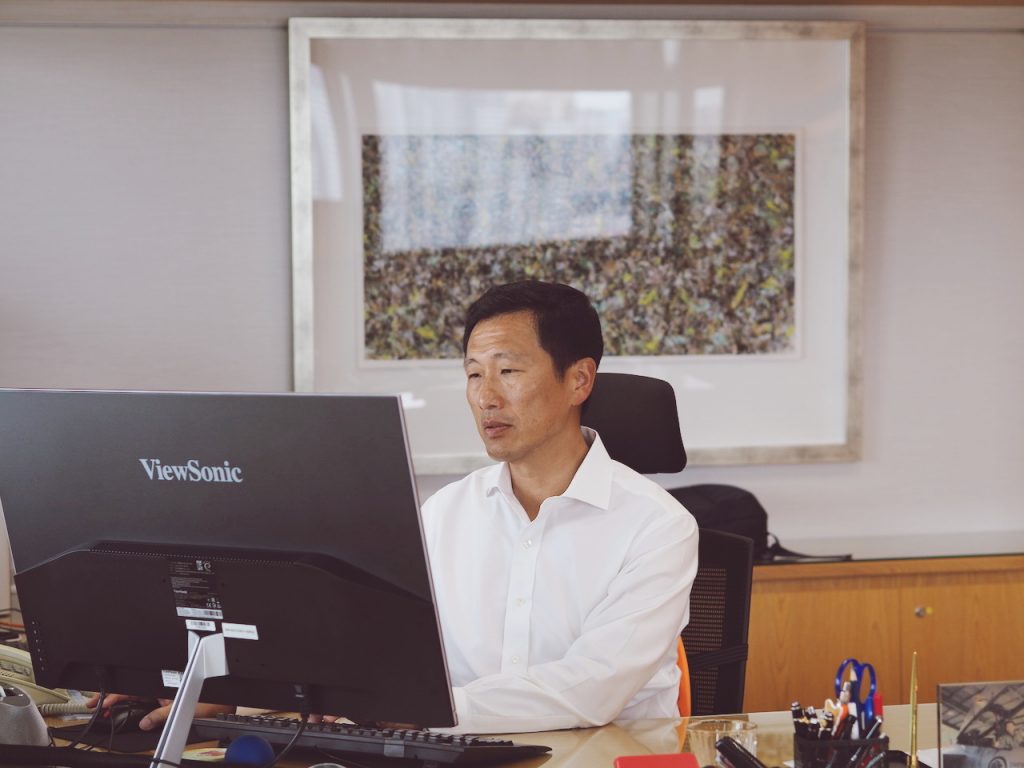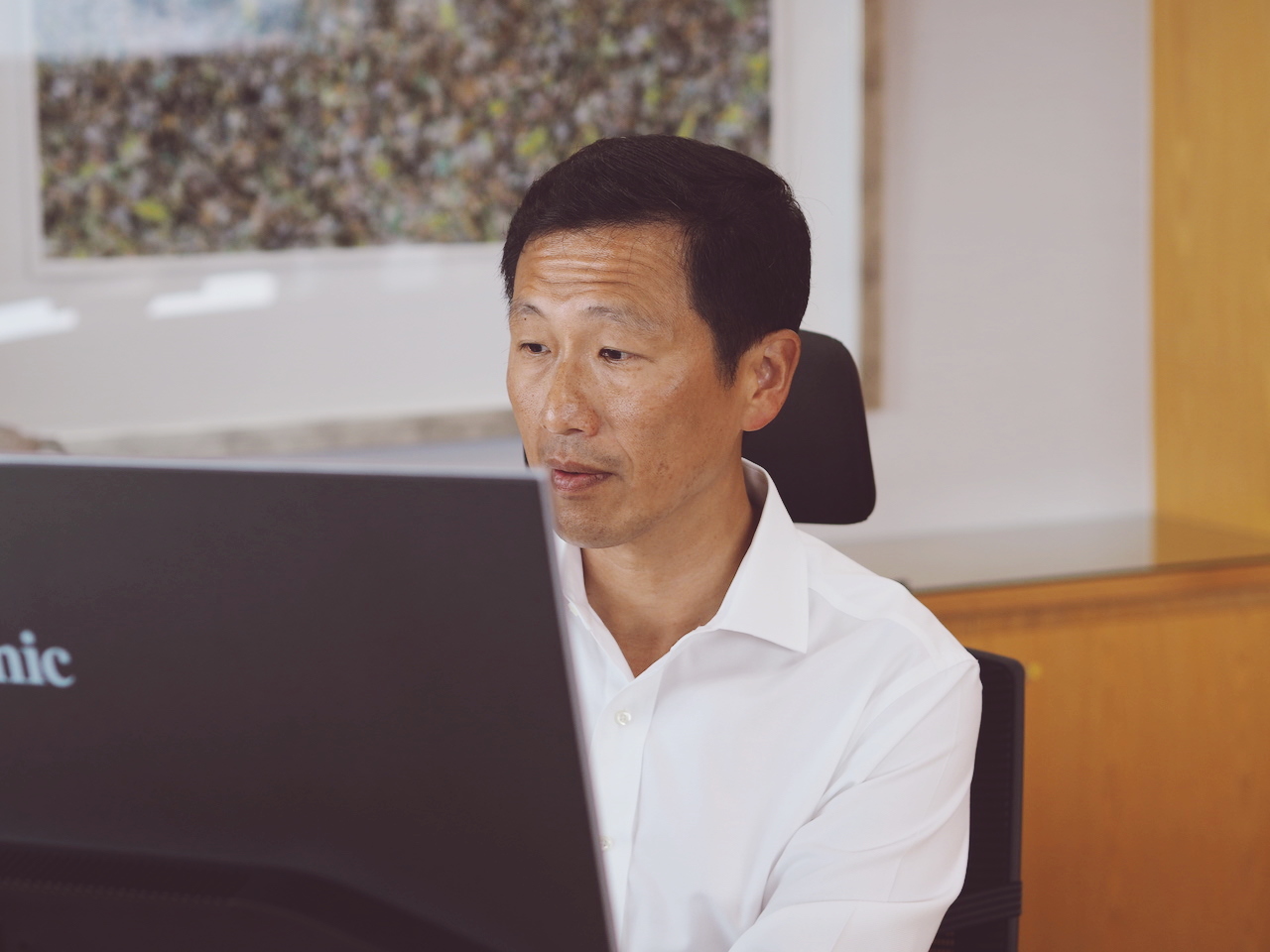All images by author.
This is the first piece in a series on failure—the f-word that terrifies many Singaporeans.
Minister Ong Ye Kung is so intimately familiar with failure that he visibly recoils in disagreement when I ask if he’s a perfectionist.
The education minister “wouldn’t say [he] has succeeded”, even though the Ministry of Education (MOE) appears to be rolling out comparatively radical changes in recent years. These include eliminating streaming in secondary schools by 2024, rolling out more aptitude-based admissions in ITE, polytechnics and universities, and parking SkillsFuture under MOE to change mindsets towards lifelong learning.
In response to his humility, I counter: “REALLY.”
“I can live with a lot of imperfections. Sometimes, you just gotta accept that not everything will turn out the way you plan. Understand why it’s so and you can try to correct it. You can even be quite tough about it. But ultimately, you have to live with it,” he explains, with the stoic patience of an educator who has to deal with an errant student.
“When I’m not happy with something, however, my staff can tell. I’ll tell them that things shouldn’t be like that. But if it is like that, then so be it. I’ll deal with it.”
Beside us, his press secretary and media relations officer smile knowingly.
Then, after a two-second pause, the minister does something no interviewee—and certainly no minister—has done with me: he admits he doesn’t know whether he’s made sense.
Even though I’m no stranger to Minister Ong’s comic timing, having watched the video where he candidly tackles Instagram questions, the unexpected hint of playfulness belies his otherwise introspective character, and catches me slightly off guard.
Later on, he informs me that his mother’s friends, who were teachers in his school, would often bring up only his disciplinary issues, even though he also had academic issues. He “muddled along” for most of his English subjects throughout his education, because he was “not so great at English”, and “struggled for 1.5 years” in JC.
If the education minister were a student today, he might actually be remarkably average. Which, in today’s context—sorry to say—would be considered failure.

About two months ago, I cold-emailed Minister Ong to ask if he’d like to chat about your average lighthearted topic: failure. Specifically, his personal and professional failures.
A couple of hours later at 11 PM, he replied succinctly: he would mull over it. He didn’t CC anyone in his response. He didn’t appear to be fazed that I, a person who had never met him, had boldly implied he had failed. He didn’t even waffle on about bureaucratic protocol, such as the need to clear the interview with his press secretary.
At 9:22 AM the next day, he agreed to my request, making our education minister more efficient than my own colleagues in replying to my Slack messages.
In hindsight, I shouldn’t be surprised at his easy comfort with the topic. As education minister, it is literally Minister Ong’s job to deal with failure every day by overseeing policies that—for better or worse—shape how our younger generation and their parents understand how success and failure look like in Singapore. It’s a heavy responsibility, especially when MOE’s policies today will affect several generations in the future, but not one he doesn’t approach with precision and perspective.
For a start, Minister Ong segments failure into two distinct categories: failure to perform and failure to achieve.
Failure to perform is “probably the worst kind of failure”; it means you didn’t even try. On the other hand, failure to achieve simply means you did not achieve the goal that you worked for.
His job is to help Singaporeans embrace the latter.
“When we talk about a society that accepts failure, we mean the latter. You did your best, you prepared, but you didn’t achieve the result you wanted. You will have setbacks; this is something you have to accept. But it cannot be a failure to perform, where you are complacent, where you didn’t try hard enough, and where you didn’t put in your best effort. That, I don’t think we can embrace,” he says.
However, embracing the failure to achieve doesn’t mean indulging in self-pity parties or making excuses to justify the negative outcome. It just means not condemning your effort or yourself, and not allowing a bad result to define your self-worth when you fail to reach your goal.
But, he clarifies, it would be a failure to perform if you don’t try to overcome your setbacks. After all, what doesn’t kill you makes you stronger.

In Minister Ong’s case, what didn’t kill him came back to try again. But lest this interview turns into hollow motivational rhetoric, I ask him to be specific.
“I know we’re both thinking about Aljunied,” he states matter-of-factly.
I laugh. Of course we are.
Before we dive in, he shares another major professional failure he doesn’t usually talk about; this happened before his team’s infamous loss of Aljunied GRC to the Workers’ Party in the 2011 General Elections.
As then Deputy Secretary-General of NTUC, he had failed to negotiate a merger between two banking unions. Back then, he lost the chance for merger by only two votes. As it turned out, two sets of leaders in one of the banks couldn’t get along, so one set decided not to vote for merger, effectively ‘wasting’ several months of his effort.
In this sense, failure boiled down to what he calls ‘life’: a clash of personality types.
After picking himself up, Minister Ong was socked with a ‘greater’ failure by losing Aljunied GRC. Following this national defeat, he listened to his instinct to leave NTUC, because it had grown “too comfortable and too enjoyable”.
His instinct instructed him to move into the private sector where he would be forced to be uncomfortable again, and to learn something new. If he succeeded there, he would consider returning to politics. Otherwise, he didn’t see any value he could bring to the table.
“When your mind is closed, you define success narrowly. This means that sometimes you will miss the target, and when you do, you feel it’s a failure. You rationalise it by telling yourself to go back to your target, and to repeat the same tactics harder and better. But sometimes that’s not the way. You have to break out totally,” he says.
In the private sector, he became the Director of Group Strategy at Keppel Corporation, where he was “very uncomfortable”, albeit in the best way. In this new world, he needed to hone completely different instincts and develop vastly distinct human relations, yet he relished the challenge.
To the layman, Minister Ong’s failures might not be ‘common’ or ‘relatable’, but he sees the importance of politicians publicly discussing their setbacks without reservation. They represent the people, most of whom would have been through setbacks or failures themselves.
Moreover, there is no point in branding oneself on social media as polished and impeccable when the truth will eventually out. He only believes in showing the public who he is and hoping they support his ideas, even when he might not articulate his thoughts as appropriately as he’d like in the moment.
For instance, clarifying his controversial comment from last year that the LGBTQ community faces zero discrimination in work, housing, and education, he says, “[What I meant was] there should not be bullying. Social discrimination is wrong. Everyone deserves dignity as a person, so we should stand up against bullying of all kinds.”
As the education minister whose target demographic (i.e. vulnerable youth) might experience precisely this sort of discrimination, I had hoped he would be more vocal and impassioned in his support for victims of bullying. Nonetheless, his clarification sufficiently, albeit superficially, addresses the actual intent of his comment.
Despite having his failures, flaws, and faux pas on display, these moments of scrutiny are normal and expected. Without them, he wouldn’t be a politician.
“Media will sometimes report literally what you say; sometimes it is a bit out of context, sometimes it is not what you meant. Sometimes our words come out faster than you think, and we are unable to compose it in the right way, so it comes out wrong. But once it is out, as a public figure you can’t take it back. You just have to say, ‘Sorry, I messed up, this is what I meant.’ Hopefully the damage is not so bad. This is bound to happen again,” he says.
It’s an enlightened perspective towards failure, not least because he welcomes it. What’s also refreshing is that he walks the talk by personally embracing the failure to achieve, before pushing through this mindset in MOE’s policies.

At the core of MOE’s policies lies the perennial tussle with meritocracy—an increasingly dirty word in Singapore, especially after last year’s narrative on inequality sparked debates on the systemic disadvantages that our version of meritocracy can entrench.
“When the system works and those who did well invest in their children, you get meritocracy encrusted at the top. That’s when people feel a sense of injustice,” says Minister Ong.
“But I think we can sustain it if we consider a broader definition of meritocracy. Our definition has been too academically-focused.”
One way is to recognise students who are not academic all-rounders through the Early Admissions Exercise (EAE) for entry into the ITE and polytechnics. In the EAE, potential students are assessed on passion and talent. He likens the process to a gymnastics competition, where there is a strong element of qualitative evaluation of the students.
On the other hand, using one’s aggregated academic scores to enter a course would more closely resemble a basketball game, where a student’s grades are accumulated over the ‘game’, and their applications boil down to comparing a number.
Both instances, however, are still grounded in meritocracy.
As someone who’s suffered about 16 years of formal education in Singapore, I can frankly attest that both strains of meritocracy make no difference when you’re caught up in the system.
When students feel a need to achieve once they perform, success seems like a linear process. Hence, the concept that one’s failures might not matter in the long run is much easier acknowledged than internalised. Essentially, failure by any other name is still failure.
One crucial way to divorce the failure to perform from the failure to achieve is to remember that you can make mistakes with less consequence when you’re young—a privilege you only realise after growing older.
The parents Minister Ong speaks to understand this too. For example, they tell him it’s how they work with people once they enter the workforce that really matters, instead of what scores they received or which schools they attended.
The trick is for parents to remember what they’ve discovered as adults, and translate that awareness into action, such as by putting less pressure on their children.
“Even as working adults, when you’re too caught up wanting to beat your colleagues to land a deal and you don’t get it, you’d feel like your whole world has collapsed. Then suddenly a failure to achieve becomes a failure to perform and you become too hard on yourself,” he explains.
“But if you continue to enjoy your work and you’re content with your personal development, then look at things in perspective and assess what’s valuable to you in life: friends, family, colleagues you get along with. You’ll be happier.”

I don’t doubt Minister Ong is happy, having figured out how to bounce back from failure even before he has hit 50. It is a milestone that many people can’t even claim they’ve accomplished on their deathbed.
It’s obvious, however, that the privilege of not sinking into depression after failing professionally is also thanks to the minister’s network and social circle. For the average Singaporean who might rely on the education system to escape their circumstances, they might not be as lucky to land an equally prestigious job if they lost their original rice bowl. They might not be able to so effortlessly get back on their feet.
But while his position in life might not be relatable, the reality is that failure cuts everyone with the same knife. It is as author Cheryl Strayed wrote: “The particularity of our problems can be made bearable only through the recognition of our universal humanity. We suffer uniquely, but we survive the same way.”
Minister Ong understands that just because someone has it better or worse than you doesn’t negate your own pain and suffering. Getting caught up in comparing your situation in life to anyone else’s is akin to purposely tugging at a loose thread that would unravel an entire tapestry. It is, ultimately, unproductive and self-sabotaging.
As a result of his sobering realisation, borne from multiple professional and personal setbacks, he appears to have attained a level of nirvana most never achieve: being deeply comfortable with himself.
Firstly, this means remaining sure of himself in seemingly uncertain and uncomfortable situations. For example, he’s not afraid of potentially awkward silences. Whenever I pose him a question that he doesn’t quite know how to reply instinctively, he pauses for a couple of seconds to think about his answer. There is no rush to quieten the deafening silence with filler words, nor clumsy stumbling over his phrases when he eventually answers, as though he were overcompensating for the dead air.
Instead, he doles out sentences with an immense exactitude that can only come from someone who has learnt English from reading widely and checking the dictionary to remember how to use certain words and phrases.
Secondly, whenever Minister Ong fails to achieve a goal or implement his beliefs in his ministry, he falls back on his “big rocks” in his life: family, health, and still getting to do things he personally enjoys. These hobbies include collecting vinyl records, reading non-fiction books on history, geography, and anthropology, and playing sports.
That said, sports is literally a sore spot for the minister. Because of his busted knee and ankle, he can’t play football anymore. Occasionally, he’d play the MP’s football game for charity, pose for a photo, “pretend to run around”, and then “go on painkillers”.
“Well, I used to run thrice a week, and now I’ve stopped that. So I go on the elliptical machine twice a week now. I also picked up swimming, which is painless,” he shares.
“Slowly. You do learn to enjoy doing other things.”
Some people say it takes 28 days to form a habit. But learning to embrace failure can take a lifetime.
Once you do become intimate with its sharp edges, and you expect the inevitable bitterness that follows suit, knowing how to accept and overcome failure becomes a fundamental part of who you are.
You realise the goal was never to prevent yourself from failing nor from reaching for anything less than perfection, but to prevent yourself from never trying at all. When you prioritise trying ahead of succeeding, you risk being fractured in new ways you haven’t discovered. You risk leaping off a cliff into an abyss of discomfort and being irrevocably broken. But, above all, you risk being shoved out of your comfort zone—a place that’s ironically primed for you to fail.
Then, if you survive, you might even get to liberate an entire nation as education minister.
What’s your definition of failure? Tell us at: community@ricemedia.co. No wrong answers.






